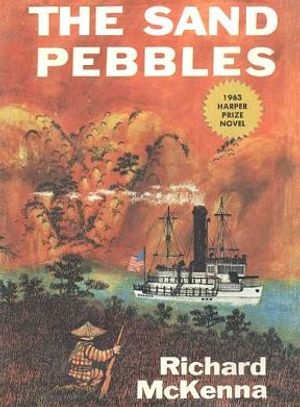So the Naval Diplomat read The Left-Handed Monkey Wrench, a collection of essays and short stories from Richard McKenna, to pass the time in airports and on planes during last week’s California odyssey. (An odyssey involving a sketchy hotel in the North Carolina countryside, and a Waffle House. But never mind.)
McKenna is best-known as the author of the novel The Sand Pebbles, which inspired the Steve McQueen film of the same name. Watch the movie if you haven’t, but read the book. It’s impossible to do a story of this sweep justice in two hours, even with the great McQueen starring.
The Sand Pebbles has been a fixture on the Chief of Naval Operations’ Professional Reading List, the leadership’s catalogue of books all mariners should read, for quite some time. And it’s easy to tell why. Most American seafarers will interact with the Far East in this age of the pivot, as indeed they have for decades.
There’s no better gateway drug to maritime Asia than McKenna’s works. After ingesting some, you will, like me, adorn your office wall with a print depicting a gunboat on the Yangtze River … autographed by Admiral Kemp Tolley, commander of the Yangtze Patrol. Yep, my office is the Big Bang Theory of nautical academe.
McKenna and I have history, I discovered from reading the biographical snippets accompanying The Left-Handed Monkey Wrench. To wit, Richard McKenna was Machinist’s Mate Chief McKenna, an engineer on board the battleship Wisconsin, for a spell after World War II. Wisconsin, of course, was my home-away-from-home during the late 1980s and early 1990s. And McKenna’s Engineering Department — a rebooted version, after the battlewagon lay dormant in mothballs for many years — was my first professional home on board.
Kinda cool to have wandered the same sweaty, noisy spaces and operated the same machinery as the ghost of a major literary figure.
For his literary endeavors, though, McKenna draws mainly from his decade of experience in USS Gold Star, the quirky station ship at Guam during the 1930s, and in the Yangtze gunboat USS Luzon just before World War II. His writings take place at the intersection among U.S. naval affairs, marine engineering, and Asian history, culture, and politics. Composed during his undergraduate studies at the University of North Carolina, for instance, his hilarious appraisal of the anthropology of the Gold Star crew will strike any American seafarer as instantly familiar — regardless of how many decades have elapsed since then.
Told through the eyes of a junior enlisted man, The Sand Pebbles recounts the deeds of the crew of the fictional U.S. Navy gunboat San Pablo during the turbulent 1920s, when various parties were vying for supremacy following the overthrow of China’s Qing Dynasty. It’s a book about the mutual fascination, and sometimes repulsion, between Americans and Chinese; the tension between American missionaries and the sailors entrusted with protecting them; and China’s descent into chaos following the collapse of dynastic rule.
The Left-Handed Monkey Wrench fills in some of the background behind The Sand Pebbles. The philosophy of history comes into play. McKenna explains that the book started out as a short story, yet grew inexorably as he grasped how big a topic he had taken on. He reports trying to separate historical fact from myth, only to conclude there’s an element of myth to all accounts of history. Causality — what factors brought about historical events — is in the eye of the beholder.
The best an author of historical fiction can do, then, is devote ample space to all contending myths and leave it up to readers to judge. Sailors, missionaries, and ordinary Chinese get their say in his pages, to illuminating effect. Authors report, you decide.
Also included in the book are excerpts from a never-finished novel of the American naval experience with 1930s Japan, titled The Sons of Martha. Together McKenna’s works help explain why Asia has entranced so many U.S. Navy mariners over the decades. Readers, or at least this one, are left wishing McKenna had finished his second epic novel — and written many more.
Check it out.

































